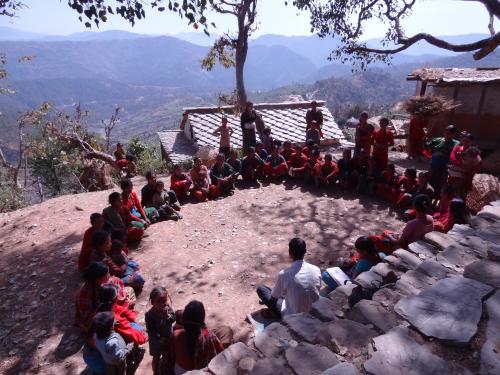
The 2007 Interim Constitution brought about hope for women in Nepal. Today, in light of the elections for a new constitutional assembly we can look forward to what hope the future holds.
The rhetoric for gender equality in Nepal looks promising. The Ministry of Women, Children and Social Welfare (MWCSW) has been established since 1995, almost two decades ago. In 2006 The Gender Equality Act entitled women to use property freely without the consent of male family members and raised the age of consent for marriage. In 2007 the Interim Constitution of Nepal mandated a 33% female participation quota across all government and local government boards. The Local Self-Governance Act reserves 20% of seats for women in the ward-level committees to increase their representation in local government institutions. Nepal is one of the few countries to allocate a gender specific budget at a local level with 10% of the budget allocated to the development of women.
Despite all the hopeful rhetoric women’s equality is still a long way off. Many Nepali women remain unchanged by the laws set in Kathmandu and are unaware of their rights. Nepali women don’t tend to participate in decision-making because they assume they will not be listened to. From a young age, girls are often forced to drop out of school for marriage, and thus have less confidence to speak out in comparison to their better educated husbands. Once married, they must seek their new family’s permission to continue their education or get a job (and even to seek medical attention). Often there is not enough money to support a wife’s education or there is too much work to be done around the home. Furthermore, much of the existing work is agriculture-based and time consuming, and women therefore have little time and energy to dedicate to local politics.
Frequently when women do participate they feel that there voice is not listened to. Women who are in decision making roles often feel like they have just been placed there to fill the quota rather than contribute meaningfully. Often women are placed on boards without even being aware that they have been nominated. Female political members state that their colleagues don’t even bother to ask them to participate in activities, as they are there just as the token female. Although on paper there is the need for female participation, in reality the belief that women have something worthwhile to contribute is not there (or is there an unwillingness to hand over the power that has been held for so long.) The lower educational attainment level of girls in Nepal has been cited as a hindering factor to meaningful participation of females. In the long term, this highlights the need for increasing educational opportunities for girls. However, this criticism often mentioned by stakeholders should not preclude a woman's right or potential to participate. The power of women's groups can be used as an illustration here. Mothers group members in Nepal, made up of a high percentage of illiterate women have significantly helped to improve maternal health.
In today’s constitution election 6000 out of 16000 candidates are women. Although this number exceeds the 33% quota in some areas, e.g. Dailekh none of the places are allocated to women. Considering how many women in politics currently feel disenfranchised, how active will these candidates be and are they truly representative?
Women’s NGO’s had exciting plans to campaign to increase the number of female voters and raise the awareness that politics isn’t just for men. However, due to the threat of pre- election violence and Bandhs, many of these plans were cancelled in light of security issues and “advice” from political sources.
In spite of all these obstructions to women gaining a truly influential role in politics there have been many positive signs over the past twenty years that Nepal is moving towards a gender inclusive political system. Today I look to the future and wonder how big a leap forward the election will be for women’s representation. I hope that there will be change and that rhetoric will become a reality for all women in Nepal.










Add new comment